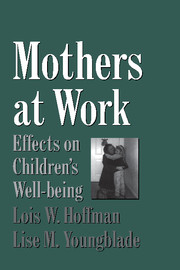Book contents
- Frontmatter
- Contents
- Preface
- 1 Introduction and Review of the Literature
- 2 Methodology
- 3 Children's Daily Family Lives: The After-School Day Interview
- 4 The Husband–Wife Relationship
- 5 The Mother's Well-being
- 6 Childrearing
- 7 Maternal Employment and Child Outcomes: The Direct Relationships
- 8 The Father's Role, Gender Attitudes, and Academic Outcomes
- 9 The Mother's Well-being and Child Outcomes
- 10 Childrearing Patterns and Child Outcomes
- 11 Nonmaternal Care and Supervision: Prevalence and Effects of Child-care Arrangements on Child Well-being
- 12 Summary and Overview
- Appendix: Measures Developed for This Study
- References
- Author Index
- Subject Index
9 - The Mother's Well-being and Child Outcomes
Published online by Cambridge University Press: 06 July 2010
- Frontmatter
- Contents
- Preface
- 1 Introduction and Review of the Literature
- 2 Methodology
- 3 Children's Daily Family Lives: The After-School Day Interview
- 4 The Husband–Wife Relationship
- 5 The Mother's Well-being
- 6 Childrearing
- 7 Maternal Employment and Child Outcomes: The Direct Relationships
- 8 The Father's Role, Gender Attitudes, and Academic Outcomes
- 9 The Mother's Well-being and Child Outcomes
- 10 Childrearing Patterns and Child Outcomes
- 11 Nonmaternal Care and Supervision: Prevalence and Effects of Child-care Arrangements on Child Well-being
- 12 Summary and Overview
- Appendix: Measures Developed for This Study
- References
- Author Index
- Subject Index
Summary
In this chapter we extend the analyses from Chapter 5 to consider the links from maternal employment to parenting styles and child outcomes, through the mother's sense of well-being. In Chapter 5, we found that working-class employed mothers were less depressed and had higher morale than nonemployed mothers, but that there was no relation between maternal employment and mothers' mood among married, middle-class women. Here, we consider the possibility that the greater advantage of maternal employment for working-class children often found in the literature is mediated by the positive effect of employment on the mother's sense of well-being. This possibility is bolstered by a large body of research that demonstrates a positive relationship between maternal mental health and both more effective parenting and children's cognitive and emotional adjustment (see Chapter 1). However, with one possible exception (McLoyd, Jayaratne, Ceballo, & Borquez, 1994), there has not yet been an adequate study that investigates whether maternal mood mediates the relationship between a mother's employment status and her childrearing orientation, or between maternal employment and children's outcomes. In a study of working-class, single, African-American mothers of adolescents, McLoyd and her colleagues (1994) found that the mother's current employment status was significantly related to depressive mood, with non-employed mothers significantly more depressed than employed. They also found that depressive mood was significantly related to both a negative perception of the maternal role and the mother's use of power-assertive discipline.
- Type
- Chapter
- Information
- Mothers at WorkEffects on Children's Well-Being, pp. 208 - 227Publisher: Cambridge University PressPrint publication year: 1999



